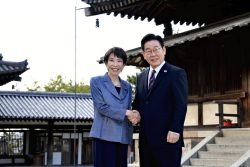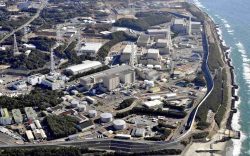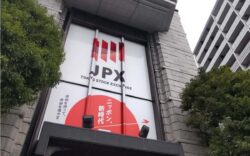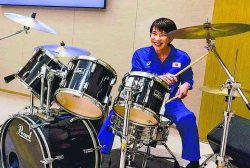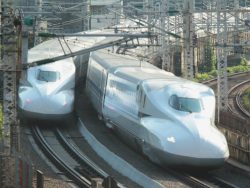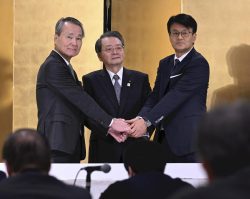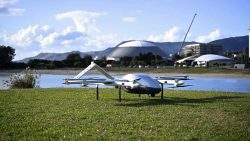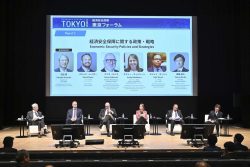12:22 JST, October 22, 2021
Taiwan Semiconductor Manufacturing Co. (TSMC), one of the world’s leading semiconductor makers, has announced it will build a new plant in Japan in response to a request from the Japanese government.
The stable procurement of semiconductors is directly related to competitiveness in all industries. TSMC’s expansion in Japan is a welcome move. It is important to use this as an opportunity to revive the Japanese semiconductor industry.
The new plant is expected to be built near Sony Group Corp.’s image sensor factory in Kumamoto Prefecture and will supply semiconductors to Sony. TSMC said that it will begin constructing the new plant in 2022 and aims to start operations in 2024. It will be TSMC’s third plant outside of Taiwan. It also has plants in China and the United States.
Semiconductors are used in all kinds of industrial products, and are often referred to as the “rice of industry.” However, as the economy recovers from the slump triggered by the novel coronavirus pandemic, demand is expanding around the world, causing global supply shortages. Automakers have been forced to drastically cut production.
Japan depends on imports for more than 60% of the semiconductors used in the country. From the perspective of economic security, the government has been working to attract companies to build plants in Japan. It is significant that TSMC, the world’s leading company in terms of semiconductor production technology, will establish a production base in Japan.
TSMC has already established a research and development base for semiconductor materials in Ibaraki Prefecture and has begun joint research with Japanese entities. It is hoped that the Taiwan maker will further expand its collaboration in this respect.
The finer the line width of the circuit on a semiconductor chip, the higher the processing capability. The new plant plans to produce logic semiconductors with a circuit line width of 22 to 28 nanometers. (A nanometer is one-billionth of a meter.)
The circuit line width in the chips of cutting-edge products such as smartphones is less than 10 nanometers, but currently Japanese manufacturers can only produce products with lines as fine as about 40 nanometers.
Although the products that will be manufactured at the new plant will not be the most advanced, demand for the chips is expected to increase for many applications, including automobiles and information technology equipment. In addition to providing a stable supply to domestic manufacturers, there are expectations that engineers will be trained at the plant and manufacturing technology will be accumulated.
The total investment in the new plant is expected to be about ¥800 billion, with the Japanese government reportedly considering subsidizing about half of the cost. This is an exceptionally huge subsidy. The government should ask TSMC not to withdraw swiftly if the market fluctuates and to prioritize supply to the Japanese market, among other requests.
On the other hand, risks are posed by placing excessive dependence on a company from Taiwan, which is at odds with China. It is desirable for Japan to rebuild its own semiconductor industry.
Japan has strengths in manufacturing equipment and materials for semiconductors. It will be important for a wide range of companies to work together to take advantage of these strengths and accelerate technological innovation, including the development of next-generation semiconductors.
The United States and Europe also intend to invest heavily in the semiconductor industry. The Japanese government needs to make efforts to revive the domestic semiconductor industry by positioning this as a top-priority area to increase industrial competitiveness.
"Editorial & Columns" POPULAR ARTICLE
-
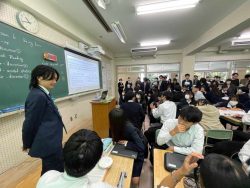
Artificial Intelligence Expands Possibilities for Foreign Language Learners
-

Build Intellectual, Physical Strength, As Well As Communicative Power / Japan Should Move from Beneficiary to Shaper of World Order
-

Global Economy in Turmoil: Prevent Free Trade System from Going Adrift / Risks to Financial Markets Must Be Heeded
-
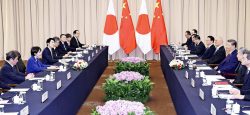
Japan-China Strain Set to Persist as Beijing Officials Self-Interestedly Bash Tokyo; Takaichi Unlikely to Back Down
-

French and German Ambassadors to Japan Call for Democracies to Unite in Defense against Russian Disinformation
JN ACCESS RANKING
-

As Chinese Tourists Shun Japan, Hotels and Stores Suffer
-

BOJ Gov. Ueda: Highly Likely Mechanism for Rising Wages, Prices Will Be Maintained
-
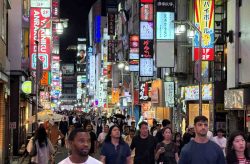
Core Inflation in Tokyo Slows in December but Stays above BOJ Target
-

Osaka-Kansai Expo’s Economic Impact Estimated at ¥3.6 Trillion, Takes Actual Visitor Numbers into Account
-

Japan Govt Adopts Measures to Curb Mega Solar Power Plant Projects Amid Environmental Concerns




